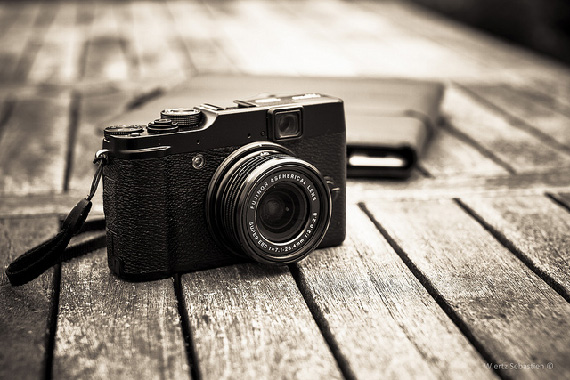Digital cameras, like most electronic devices, need extra care when being handled. They have sensitive parts that can be damaged by improper handling. These are the most common practices that can help you maintain your camera so that you can use it for a much longer time.

photo by Sebastien Wiertz
1. Keep your camera from getting wet unless it’s waterproof. Otherwise, moisture will build up inside it, which will destroy your camera’s internal components.
2. If you’re using a rechargeable battery for your camera, the time will come when it no longer works as well as it used to. Typical Lithium Ion batteries last up to 500 cycles, after which a decline in performance can be noticed. Dispose of your batteries properly and replace them with new ones.
3. Always keep your lens clean. This is especially the case if you have a digital SLR, as its lens is more complex and needs better maintenance. Read your user manual on how to maintain your lenses.
4. Avoid dropping your camera. As mentioned earlier, your camera contains sensitive equipment which may be destroyed by excessive shaking or impact.
5. When shooting pictures at the beach or at sea, make sure to protect your gear by waterproofing it well. Salt water can corrode your camera. Gently wipe its surface with a cloth dipped in fresh water to rinse off remnants of salt water. Wipe it dry after.
6. Handle all moving parts of the camera with care. Never force hinges, buttons, or dials if they seem stuck. Call tech support who can walk you through possible fixes or advise if the camera is in need of repair.
7. Turn off the camera before removing or disconnecting the power source or a cable or removing the battery or memory card.
8. Store your camera correctly if it isn’t going to be used for a long time. Keep it in a cool, dry place with packets of silica gel to prevent condensation, and remove the batteries.
9. Do not place a camera in direct sunlight for prolonged times or in a car when it is hot. Pointing the camera lens toward strong sunlight for a prolonged time can ruin the sensor.
10. Do not apply lens cleaning fluid directly to the lens. If needed, place a few drops on a camera cleansing cloth. Microfiber cloths are highly recommended.
11. Always replace the cap on your camera’s lens when not in use. Dust will readily settle on an exposed lens.
12. Use a strap to avoid accidentally dropping your camera.
Finally, always refer to your camera’s user manual for specific instructions.
About the Author
Riyad Aljarallah writes for photonet aljarallah. He is a photographer and writer.
Like This Article?
Don't Miss The Next One!
Join over 100,000 photographers of all experience levels who receive our free photography tips and articles to stay current:






I found out that you can buy waterproof cameras straight from manufacturers or you can find a trusty source that can take apart the camera exterior parts and put water tight gaskets in between the parts where they connect to keep water from seeping in through the cracks…but the lens still needs to be protected either way
Is there some type of spray or rub you can put over your camera to waterproof it?
Might copy and paste this then shorten the ones I need to remember into a document that I can print up and put in my camera case. Thanks!
how do you “waterproof” a camera?
“make sure to protect your gear by waterproofing it well”.
Lens caps cause missed photos in my view.
That;s why #11 recommends that you put the cap “when NOT in use.”
oh thank you ! I never thought I should avoid dropping my camera !!
Thanks, just made one correction outta reading ds.
Thank you for this valuable list of tips. I would like however to add a tip No. 13 – out of my own painful experience:
When you lay down your camera on a table, always make sure to wrap the camera strap around the camera, and never let it dangle over the edge of the table. This helps to avoid that you could catch in the strap and accidentally cause the camera to take a dangerous plunge.
Don’t laugh – this has happened to me several times, not always without costly consequences.